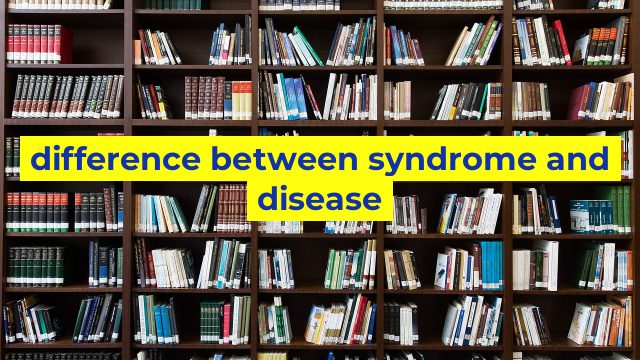The Difference Between Syndrome and Disease
Medical terms can be confusing, especially when it comes to diseases and syndromes. Even though they both refer to medical conditions, there are significant differences between these two terms. In this article, we will discuss the differences between a syndrome and a disease.
What is a Syndrome?
A syndrome is a group of symptoms that occur together and indicate a particular disease or abnormality. The term “syndrome” is usually used when a specific cause for the symptoms is unclear.
For example, Down syndrome is a genetic disorder that occurs when an individual has an extra chromosome 21. This genetic difference can cause a range of developmental and intellectual difficulties, but it’s not always clear why someone with Down syndrome experiences their specific symptoms.
Another example is chronic fatigue syndrome (CFS). While the characteristics of CFS are known, the exact cause is still unclear.
What is a Disease?
A disease, on the other hand, is a medical condition that has a known cause, diagnostic criteria, and a clear set of symptoms that are associated with it. A disease can happen due to a specific agent or a metabolic dysfunction.
For example, HIV is a viral disease that attacks the immune system. Cancer is a disease that happens when abnormal cells grow and spread uncontrollably.
The Key Differences Between Syndrome and Disease
The primary differences between a syndrome and a disease are as follows:
1. Cause: Syndromes often don’t have a known cause, while diseases do.
2. Diagnosis: A syndrome is usually identified by a set of characteristic symptoms, while a disease requires extensive testing and diagnosis to confirm the presence of a specific medical condition.
3. Treatment: The treatment of a syndrome focuses on managing symptoms, while the treatment for a disease focuses on treating its underlying causes.
The Bottom Line
While the terms syndrome and disease can sometimes be used interchangeably, it’s important to understand the key differences between them. A syndrome is a collection of symptoms without any clear cause, while a disease has a known cause and characteristic symptoms that can be diagnosed and treated accordingly. Understanding these distinctions can help patients navigate their medical conditions and receive the right treatment.
Table difference between syndrome and disease
| Syndrome | Disease |
|---|---|
| A collection of symptoms that are typical of a certain condition or illness, but do not necessarily have a known cause or single underlying mechanism. | An abnormal condition or disorder that affects a person, animal, or plant, often caused by an infection, genetic defect, or environmental factor. |
| May be caused by multiple underlying conditions or mechanisms. | Usually caused by a single underlying condition or mechanism. |
| May have varying degrees of severity and duration, depending on the underlying condition or mechanism. | Generally has a predictable course and prognosis, depending on the underlying cause and treatment. |
| May be diagnosed based on a combination of physical signs and symptoms, medical history, and laboratory tests. | May be diagnosed based on physical examination, laboratory tests, imaging studies, and other diagnostic procedures. |
| Treatment may focus on managing symptoms and underlying conditions, rather than curing the syndrome itself. | Treatment generally focuses on curing the disease or managing its symptoms, depending on the underlying cause and severity. |
